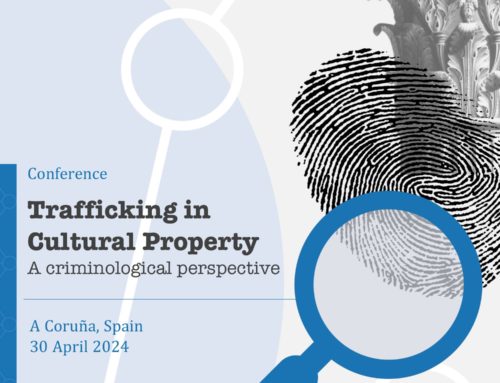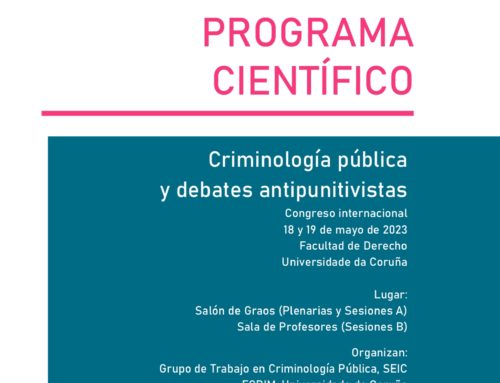
INTERNATIONAL WORKSHOP
Changing landscapes of immigration detention
Location: Faculty of Law, University of A Coruña (Spain)
Dates: September 1-2, 2022
Call for papers
Coordinators: Ana Ballesteros Pena (Complutense University of Madrid, Spain)
and Cristina Fernández Bessa (University of A Coruña, Spain)
Scientific committee: Iker Barbero (University of the Basque Country, Spain), Ulla Berg (Rutgers University, USA), Carolina Sánchez Boe (Aarhus University, Denmark), José A. Brandariz (University of A Coruña, Spain), Giulia Fabini (University of Bolonia, Italy), Elisa García-España (University of Malaga, Spain), Kelly Hannah-Moffat (University of Toronto, Canada), Witold Klaus (Polish Academy of Sciences, Poland), Audrey Macklin (University of Toronto, Canada), Raquel Matos (Catolica University of Portugal, Portugal), Romina Ramos (Arturo Prat University, Chile), Sarah Turnbull (University of Waterloo, Canada) and Joao Velloso (University of Ottawa, Canada).
Immigration detention regimes have been characterized for their great degree of flexibility and expandability. We have witnessed a constant mutation of detention facilities, decision-making tools and rationales for detention, technologies, geographical locations, practices of supervision and control of detainees and ex-detainees post-detention and stakeholders involved. The gendered and racialized nature of detention has adopted multiple forms across space and time. Furthermore, artificial intelligence (AI) and digital tools are increasingly permeating the practices of border control, detention and containment of unwanted mobility. Changes and differences can be witnessed at the subnational, national and continental level, especially between Global North jurisdictions and Global South jurisdictions. In the EU, the configurations of immigration detention regimes in Southern European countries have little to do with the dynamics in the Nordic Countries or in the east of Europe. Despite the existence of this variability, scholars in the field are still in the process of capturing the particularities of different systems. This exploration will provide empirical evidence of the evolution and functioning of each model and, importantly, will also add new insights to cross-national conversations on immigration detention.
Despite some common trends that can respond to the multi-scalar nature of these detention systems as well as to the transference of political ideas connecting different jurisdictions, immigration detention does not tend to show a significant level of convergence. On the contrary, the dynamic contexts in which immigration detention takes place are traversed by supranational, national, regional and local interconnections. In addition, national systems of detention are shaped by a particular set of socioeconomic, political and legal trends historically configured and connected to countries’ post/neo/colonial histories. Furthermore, other influential forces can play a significant role in the ways in which detention regimes are set up such as immigration and refugee models and the influence of specific penal traditions on immigration detention technologies. Thus, academic debates in this field may be enriched by boosting dialogues that put together different scales, disciplines and geographical interests.
This international interdisciplinary workshop provides an opportunity to reflect, both conceptually and empirically, on the changing and mutable nature of immigration detention regimes across the globe.
We seek contributions on the following topics, amongst others:
- Immigration detention, including pre- and post-detention practices.
- Crimmigration practices involving immigration detention.
- The role of different actors in the immigration detention complex.
- The use and impact of digital technologies and AI related to border control and penality.
- Agency and resistance of different actors involved in detention, supervision, and other forms of border and migration control.
- Other exclusionary practices against migrants and asylum seekers.
- Spatial practices of detention, containment and exclusion.
- The impact of gender, race, and (post/neo)colonialism in practices of border control and immigration detention.
- Emergent places of detention and containment of migrants: informal settlements, hotspots, temporary reception centers and the like.
- Humanitarization and other legitimizing discourses of immigration containment or detention
Confirmed keynote speaker: Kelly Hannah-Moffat (University of Toronto, Canada), Sanja Milivojevic (University of Bristol, UK) and Martina Tazzioli (Goldsmith, University of London, UK).
This is an interdisciplinary event which aims to bring together scholars from various disciplines, such as criminology, sociology, social policy, law, human geography, anthropology, political science, and psychology. Early career scholars are particularly encouraged to send abstracts. Attendance is free.
Please email your proposal (250 words maximum) by 23:59pm (GMT+1) on 20th March 2022 at changingdetention@gmail.com.
For early career researchers (PhD students and post-doc researchers) from outside the EU and researchers from the Global South, we are pleased to offer, at least, two travel bursaries covering travel and accommodation costs. Please, send your motivated request along with your abstract to changingdetention@gmail.com.
We aim to publish the papers discussed in this international workshop as a special issue of a journal. If you are interested in putting your work forward for consideration, please indicate this in your proposal.
Information about acceptance will be sent by 2nd April 2022.
The workshop is planned to be in-person in the University of A Coruña (Spain), although provisions for online participation can be made in particular, individual circumstances. Furthermore, we will be closely monitoring COVID pandemic evolution in order to move to hybrid or on-line if the health situation recommends this.
The workshop is part of the European Commission funded project Governmigration: Governing irregular immigration through detention. Discourses and practices from an interdisciplinary approach, under the scientific program Horizon 2020 within Marie Sklodowska-Curie Actions. It is sponsored jointly by the ECRIM Research Group, Faculty of Law, University of A Coruña (Spain), the Centre for Criminology & Sociolegal Studies, University of Toronto (Canada) and the Complutense University of Madrid (Spain).
Thank you!






Leave A Comment